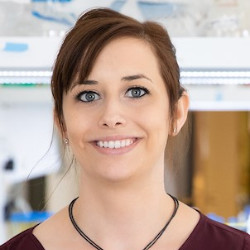Alison E. Patteson, assistant professor of physics in the College of Arts and Sciences, has been recognized by the American Physical Society (APS) with a national prize. Patteson received the 2024 Maria Goeppert Mayer Award, which recognizes outstanding achievement by a woman physicist in the early years of her career.

Patteson is a member of the BioInspired Institute and leads an institute focus group for mechanics of development and disease. Her research group studies biophysics and soft matter—specifically, how cells navigate and respond to the mechanical nature of their physical environment. She and her team are currently investigating how the structural protein vimentin affects cell migration and are also exploring the physical factors that control the growth of biofilms, which are slimy clusters of microorganisms including bacteria and fungi that can adhere to wet surfaces.
Learn more about Patteson’s interdisciplinary collaboration to find new solutions to challenges like SARS-CoV-2, the virus responsible for COVID-19.
“Ali Patteson is an outstanding researcher, educator and service member in the Syracuse Physics Department,” says Jennifer Ross, professor and chair of physics. “Not only is her research excellent, but she is also a valuable collaborator within the department and Syracuse University community. And, she is a wonderful mentor and departmental contributor. She is truly a model of the teacher-scholar model we hope to all embody in Syracuse physics.”
APS President Robert Rosner cites Patteson’s important research contributions in characterizing the physics of living systems, including demonstrating how mechanics influences the collective behavior of bacteria and how intermediate filaments in a cell’s cytoskeleton impact its mechanics, migration and signaling. “This APS honor embodies a distinguished recognition within the academic community and necessitates adherence to the highest standards of professional conduct and integrity,” says Rosner of the award, named for the 1963 winner of the Nobel Prize in Physics, Maria Goeppert Mayer.
A Year of Achievements
Patteson has garnered several additional grant awards in 2023 recognizing her research. There were two in February including a 2023 Cottrell Scholar award, an honor that ranks her among the country’s best faculty researchers and teachers from the fields of astronomy, chemistry and physics. Currently, only two other New York state universities have more Cottrell-awarded faculty: Columbia and Cornell. Also, Patteson was awarded an Alfred P. Sloan Foundation Fellowship, honoring U.S. and Canadian researchers who exemplify the next generation of research leadership.
“I’m deeply honored and grateful to receive the Maria Goeppert Mayer Award, which would not have been possible without the support of my students and Syracuse community,” says Patteson.
About the Award
The award is presented to a woman, no later than seven years after she received a Ph.D., each year to recognize scientific achievements that demonstrate her potential as an outstanding physicist. It comes with a monetary prize of $5,000 and travel support to give three lectures in her field of physics and at the meeting of the APS to receive the award. The presentations are attended by students and can have a meaningful impact on their academic and professional trajectory. Patteson will travel to Minneapolis in March 2024 to accept the award and give a presentation.
Originally from Germany (now an area in Poland), born in 1906, Maria Goeppert Mayer was a physicist and mathematician who proposed the nuclear shell model of the atomic nucleus which explained “why certain numbers of nucleons in the nucleus of an atom cause an atom to be extremely stable.” She was a trailblazer, both in her field and for women in science, as one of only four women to win a Nobel Prize in physics.
Patteson joins Lisa Manning, associate professor of physics and William R. Kenan, Jr. Professor of Physics, who received this award in 2018, for her research into soft, living matter. Manning and Patteson are the only two Syracuse faculty to receive the annual award since it began in 1986.
